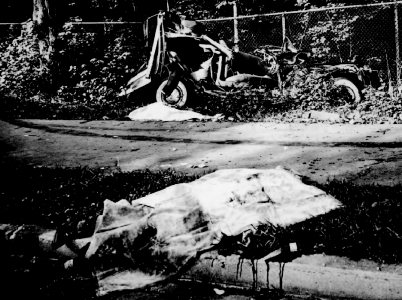
Tonight at Observatory! Hope to see you there!
Radical Detectives: Forensic Photography and the Aesthetics of Aftermath in Contemporary ArtYou can find out more about the presentation here. You can get directions to Observatory--which is next door to the Morbid Anatomy Library (more on that here)--by clicking here. You can find out more about Observatory here, join our mailing list by clicking here, and join us on Facebook by clicking here.
An illustrated lecture by artist and former forensic photographer Luke Turner
Date: Tuesday, July 13
Time: 8:00 PM
Admission: $5
Presented by Morbid Anatomy
Forensic autopsy, crime, and death scene photographs hold a strong fascination in culture. These specific types of photographs present to the viewer a mediated confrontation with horror. In the context of a courtroom, there is a presupposition that the scientific or analytic use value assigned to the photograph will function to shift the viewer’s position from voyeur to detached collector of facts relevant to the legal system. Yet neither position is stable, and the psyche must contend with a complexity of vision that exceeds either classification.
In this slide show, artist and former forensic photographer Luke Tuner will present images from the history of forensic photography, slides from cases that he has photographed, and documentation of modern and contemporary art works that engage the viewer in the reconstruction process. Some relevant concepts explored by artists are crime scene reconstruction in Pierre Huyghe’s “Third Memory”, entropy in the work of Robert Smithson, accumulation in Barry LeVa’s pieces, the logic of sensation in the painting of Francis Bacon, something about that guy that had himself shot in a gallery, and many more. He will also discuss the curatorial work of Ralph Rugoff, and Luc Sante who have both made important connections between art and the forensic image.
Thoughts by philosophers of the abject/scientific, such as Julia Kristeva, Georges Bataille, Paul Feyerabend, Paul Virilio, and others, will be brought into play with the visual presentation. We will explore strategies of resistance to an “official” culture that attempts to legitimize a fixed methodology for the interpretation of evidence. As we emerge from art and philosophical tangents, the lecture will conclude with an argument for why the characters of Agent Dale Cooper from Twin Peaks and Laurent, the protagonist of Alain Robbe-Grillet’s The Erasers, personify two notions of the radical detective through their unconventional approaches to the interpretation of evidence.
Luke Turner is an artist / writer / gallery preparator, who previously worked for three years as a forensic photographer for various Medical Examiner and Coroner’s Offices. Luke has lectured at Glendale Community College in Los Angeles and at California College of the Arts in San Francisco. He is the recent founder of the art blog Anti-EstablishmentIntellectualLOL!.
Image: "Car accident" 1940 - Photograph by Weegee, found here.


2 comments:
"We will explore strategies of resistance to an “official” culture that attempts to legitimize a fixed methodology for the interpretation of evidence.We will explore strategies of resistance to an “official” culture that attempts to legitimize a fixed methodology for the interpretation of evidence."
...can't let that pass without comment. It would be a bit of a stretch to suggest that there was an alternative.
In some cultures the most vivid version of events is held to be the most truthful. Not suggesting that are we?
No, I was not suggesting what you write at all. Rather that the interpretation of evidence is culturally learned/conditioned, and our current system should be questioned. Aspects of our techno-legal bureaucracy such as the value placed on witness testimony, the validity of crime scene reconstruction graphics, and the adversarial nature (prosecution narrative vs. defense narrative) of our legal system all should be open for reconsiderations. Your position that there is no possibility for proposing an alternative to official or dominant culture seems cynical and untrue. Resistance takes new form.
Post a Comment